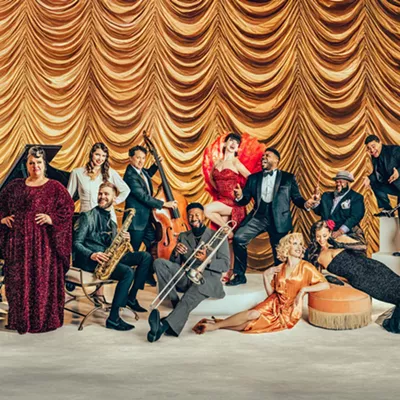And if you ever get lonely?
"Just go to the record store and visit your friends," she suggests. A good record store is more than just a supermarket of music; a good record store has character, great music, informed employees and, yes, friends.
But the music business is an unpredictable thing. Just take a gander at its track record: 78s, vinyl, 8-track, cassette, compact disc, digital download. Thirty years ago, a CD easily could have been mistaken for a space-age Frisbee, the now-ubiquitous "iPod" for a detonator.
Today? It seems the iPod exploded the CD's chances of survival.
As a result, places that sell music have seen hard times, too. Music Millennium, a hipster Mecca on Portland's Northwest 23rd Street, closed its doors last August 31 after about 30 years of business because management could not afford rent. It was too expensive to stock the shelves with the work of underground artists. The media titans, Rolling Stone for one, are busy covering the music industry's impending funeral: Reports in that magazine indicate album sales have fallen 25 percent since 2000.
The message is clear. It is impossible for the little guys to overcome the one-two punch of the corporate chains and the virtual music stores. Bob Gallagher, owner of local record store 4000 Holes, admits business has been "shitty" this year, but not because of Wal-Mart, Best Buy or iTunes.
"It's the economy. Not downloading," he insists.
Gallagher doesn't worry much about downloading because he believes he has something iTunes doesn't. Tony Brown feels that way too. Two years ago, the owner of Unified Groove Merchant in Spokane, not seeing a promising future in the compact disc, decided to carry fewer CDs and sell vinyl records instead. It was a gamble that he believes has paid off. Business is far better this year than last.
"We get 15-year-old girls to 80-year-old men in here," Brown says of the diverse clientele at his record store who come to dig among the approximately 100,000 records. CDs still sell, Brown says, but he maintains Unified makes 80 percent of its earnings off vinyl. "Vinyl is stronger than the American dollar," he says with a wry grin. "It's a hot commodity, for sure."
Gallagher's 4000 Holes is several blocks south of Brown's place, and he, too, knows the attraction of a record. It's a disease, he says. He calls it vinylitis. "People will look at records and they can't tell you why, but they like them," Gallagher says. "To hold a record in your hand is a wonderful thing."
He's less forthcoming about the volume of records he sells but says it's in the ballpark of 40 percent records to 60 percent CDs and cassettes.
"Vinyls are up a good 30 percent, for sure," he says.
& lt;span class= & quot;dropcap & quot; & Y & lt;/span & ounger generations, to some extent, are catching vinylitis. And bands like Radiohead have taken notice, accommodating fans with a vinyl release of its much-buzzed In Rainbows. Indie labels, rappers - even Paul McCartney and Neil Young continue to release vinyl as well.
There were a couple of 20-somethings in Gallagher's store Thursday, sitting on plastic crates pawing through Gallagher's cache of records. Matt Henry has been here a couple of times and likes what he sees. Erin Kawabata does, too, and she says the two are in the market for a record player. Henry says he's jealous of the vinyl generation because records produce a crisper sound, a different experience. "I'd much rather have a Michael Jackson record," Kawabata agrees. "It seems more classic."
Back up the road at Brown's store, he was bumping music as he replenished the shelves with records. He was listening to a CD, he admitted sheepishly. Though he is much younger than Gallagher, he is less appreciative of the iTunes era. "What's an iPod?" he asks facetiously. "My daughter hid hers from me for three months. She thought I'd get mad at her."
Nic Fritze is a manager at Long Ear in Coeur d'Alene and he says downloadable music has affected business. The iPod's success is no secret: Apple's iTunes store is in the top five for music sales. A sign of the times, perhaps - but "you've got to diversify," Fritze says. His shop did. The Long Ear now sells adult novelties and body jewelry in addition to the records.
"There's been a lot more resurgence toward vinyl," he says, noting many record labels have begun to re-offer their artist's albums on that medium. Long Ear specializes in those, too. "Any retail establishment, you've got to have options," he says.
Whether vinyl will remain in high enough demand to keep these small, independent retailers afloat isn't certain. But the preference for vinyl seems to touch on a basic need that the digital era doesn't - contact. People who are into vinyl talk about the feel of it as much as the sound. They mention the people in record stores as much as the selection. Even if vinyl wanes in popularity, then, there's a chance the stores can still fill that niche, as a place to go when you're lonely. A place to be among friends. Collecting vinyl is still a fringe business, not enough to prop up a bloated industry. For this small percentage of sellers, though, the formula is working.






















